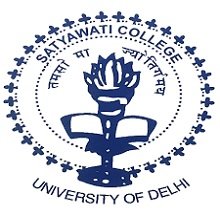MASTER OF SCIENCE [M.SC]
2 Years
M.Sc. Program Structure at Satyawati College
The M.Sc. program typically spans two years, divided into four semesters. The program offers specialized knowledge and skills in science, with both theoretical learning and practical laboratory experience. Students in the M.Sc. program are also encouraged to engage in research projects.
M.Sc. Specializations Offered at Satyawati College
While the specific M.Sc. specializations offered may vary depending on the department and college, common M.Sc. programs in science at the University of Delhi include:
-
M.Sc. in Chemistry
-
M.Sc. in Physics
-
M.Sc. in Mathematics
-
M.Sc. in Zoology
-
M.Sc. in Botany
-
M.Sc. in Environmental Science
-
M.Sc. in Microbiology
-
M.Sc. in Biochemistry
Each of these programs is designed to provide students with a deep understanding of their respective disciplines, focusing on both theoretical concepts and practical applications in the real world.
Program Structure
The M.Sc. program is designed to offer both depth and breadth in the field of study. The structure typically includes:
-
Core Courses: These are the fundamental subjects that are essential to the discipline. For example, in M.Sc. Chemistry, core courses would include Organic Chemistry, Inorganic Chemistry, Physical Chemistry, etc.
-
Elective Courses: Electives offer students the opportunity to specialize in certain areas within their field of study. These are advanced topics that provide a deeper dive into specific subjects.
-
Practical/Laboratory Work: M.Sc. programs involve significant practical or laboratory components, where students apply theoretical knowledge in a controlled environment to gain hands-on experience.
-
Research Project/Dissertation: Many M.Sc. programs require students to complete a research project or dissertation in their final year, which allows them to explore specific scientific questions in depth and contribute to the field's knowledge.
-
Seminars and Workshops: Throughout the program, students may also participate in seminars, workshops, and guest lectures, allowing them to stay up-to-date with the latest advancements in their field.
Eligibility Criteria
To be eligible for the M.Sc. program at Satyawati College, candidates must:
-
Have completed a B.Sc. (Hons.) or an equivalent degree in the relevant field from a recognized university.
-
Meet the specific subject requirements as per the program (e.g., a B.Sc. in Chemistry for M.Sc. Chemistry or a B.Sc. in Physics for M.Sc. Physics).
-
Admission to the program may be based on the entrance exam conducted by the University of Delhi or merit-based depending on the subject and department.
Career Opportunities After M.Sc.
Graduates of the M.Sc. program have a wide range of career opportunities in various scientific fields, both in the public and private sectors:
-
Research and Development: M.Sc. graduates often pursue careers in scientific research, working with research institutions, universities, or private labs.
-
Higher Studies: After completing an M.Sc., students can pursue further studies like M.Phil. or Ph.D. in their chosen field.
-
Teaching: With an M.Sc. degree, graduates can become college or university lecturers (after qualifying necessary exams like NET), or they may teach at the school level after completing B.Ed..
-
Industry and Private Sector: M.Sc. graduates can find employment in industries such as pharmaceuticals, biotechnology, chemical companies, environmental consultancies, food industries, etc.
-
Government Research Institutes: Opportunities are available in government-funded research institutes like CSIR, DRDO, ISRO, and ICAR for roles in research, development, and technology.
-
Healthcare Sector: Graduates in fields like Microbiology, Biochemistry, and Environmental Science may work in hospitals, diagnostic centers, healthcare startups, or pharmaceutical companies.
-
Environmental and Conservation Agencies: With an M.Sc. in Environmental Science, students may work in government bodies, NGOs, and environmental consultancy firms.
-
Corporate Sector: Graduates can also enter the corporate sector, working in areas such as data analysis, product development, quality assurance, and more.
Why Choose M.Sc. at Satyawati College?
-
Comprehensive Curriculum: The M.Sc. programs at Satyawati College offer both theoretical knowledge and practical skills, which are essential for a successful career in science.
-
Experienced Faculty: The faculty at Satyawati College includes highly qualified professionals who guide students through advanced concepts and research techniques.
-
Research Opportunities: The program encourages research and critical thinking, offering students the chance to contribute to the scientific community through independent projects.
-
State-of-the-Art Laboratories: The college provides modern laboratories and facilities for hands-on learning and research, ensuring that students gain practical experience.
-
Extracurricular Activities: Satyawati College organizes various events, seminars, and workshops that provide exposure to current scientific trends and networking opportunities.






 OMAWATI686b96fcc7a5c.jpg)